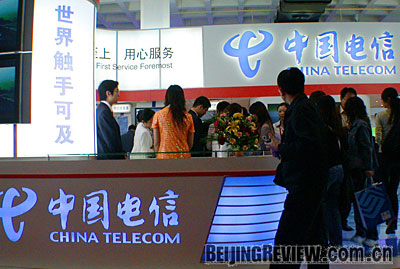|

GAIN A LEAD: China Telecom Corp. Ltd. is one step ahead of its major rivals in China in exploring WiFi-enabled mobile services (CFP)
Hangzhou-based Huawei-3Com Co. Ltd. (H3C) has won 40 percent of China Telecom's contracts worth 200 million yuan ($29.4 million) to provide network solutions during the operator's first-phase of WiFi network deployment, according to China Telecom. H3C is a joint venture between Huawei Technologies Co. Ltd., China's top telecom equipment maker, and 3Com Corp. of Marlborough, Massachusetts. In deploying its WiFi hotspots, China Telecom has given priority to hotels, parks, commercial streets and campuses.
Apart from China Telecom, local governments in large and medium-sized cities, especially those in eastern coastal areas, are setting up wireless networks as well. Currently, the cities of Shanghai, Hangzhou, Fuzhou and Guangzhou have set up public outdoor wireless Internet access hotspots.
China Telecom is considering introducing more kinds of WiFi-enabled mobile phones while rolling out its WiFi network. ZTE Corp. of Shanghai has designed many sample phones for the operator, while Shenzhen-based Skyworth Mobile Communication Co. Ltd. (Skyworth Mobile) has set up a branch in Beijing to develop WiFi phones for the same operator. More domestic mobile phone makers have said they would increase their investments in WiFi phone research, development and production, including Taiwan-based Dopod International Corp., Hong Kong-based Gionee Communication Equipment Ltd. and Skyworth Mobile.
The competition unfolds
China Telecom has gained a lead over its domestic rivals, China Mobile and China Unicom, in WiFi, because it enjoys cost advantages in the technology. The operator constructed huge cable network resources before the latest round of industry restructuring and can turn each node on the network into a WiFi hotspot with a router.
Furthermore, it will acquire China Unicom's CDMA services during the current industry restructuring. The CDMA network has an edge over WiFi, because it has stronger signals and wider signal coverage. China Telecom could combine its WiFi and CDMA networks to provide nationwide wireless broadband network coverage at low costs.
China Mobile is eyeing the WiFi market as well. The company launched its wireless network for trial commercial use in 2003, but so far has failed to extend the coverage. Making use of its sponsorship of the Beijing Olympics, China Mobile kicked off WiFi-based wireless Internet access services in its "wireless city" campaign.
Both China Telecom and China Mobile currently offer various Internet access service packages containing a WiFi element.
As they gain popularity, WiFi phones will create a ripple effect in driving down high mobile call charges, Liu said. He believes increased WiFi services could force the three major operators to slash their wireless calling fees to attract subscribers. So far, however, China Unicom has no plans to develop WiFi-based services.
The competition will take another form between domestic and overseas mobile phone makers. Currently, overseas mobile phone makers such as Apple Inc., Nokia Corp., Motorola Inc., Samsung Electronics Co. Ltd. and Sony Ericsson Mobile Communications (USA), Inc. control WiFi technology, and most of their products are WiFi-enabled. They will have a number of WiFi phones ready to offer to customers here once the Chinese Government relaxes its policies.
But when that happens, domestic phone makers could still be designing their first WiFi phones, Liu said. So far, these manufacturers have not placed high precedence on developing WiFi phones, because of the government's restrictions. This would put Chinese phone makers at a disadvantage in competing with overseas brands if the government and operators give them no policy support or time to make preparations before the restrictions are lifted, he said. | 